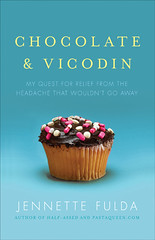A few weeks ago I was contacted by the author Jennette Fulda, who asked if I would be interested in receiving a copy of her new book to read and review.
I replied, “Let me think about it YESPLEASESENDITRIGHTNOW!”

Chocolate & Vicodin is a story that so many of us here, unfortunately, are all too familiar with-mysterious chronic pain that shows up, sets up camp, and never ever goes away. In Jennette’s case, it is a headache that randomly showed up about 3 years ago without any apparent cause, resisted any improvement despite Fulda’s NUMEROUS attempts at various treatments, and has yet to go away.
One of my favorite parts of the book is the fact that she starts every chapter with some of the emails sent in by her blog readers, suggesting possible causes (such as a congested chakra, or a spirit hanging around her head in the form of a halo), and treatments (cheer up!, get your hair analyzed for the presence of toxins!) that they felt she should consider. (Because being told how to manage your health by people who have ABSOLUTELY NO IDEA what they are talking about is oh so helpful.)
Jennette has kindly agreed to visit us here at Cranky Fibro Girl today to discuss her book, as well as some of the situations she’s faced over the past few years as someone who lives with chronic pain.
Hi, Jennette, and welcome! We’re so glad to have you here. So let’s get started.
1. When I think about dealing with chronic pain and chronic illness, the first thing that comes to mind for me is the idea of QUESTIONS. I think that in the past 3 years, thanks to umpteen million doctor visits, as well as trying out all kinds of different therapies and treatments, I have been asked more questions than I have in the 35 years before I got sick.
So I was just wondering-are you tired of all the questions too? Is there a particular question that you wish people would STOP ASKING YOU, ALREADY?! (Mine is, when visiting my fibro doctor and discussing any current flare-ups is, “So, what do you think might have caused it?” I DON’T KNOW! That’s why I’m coming to see you!)
Then, on the other hand, is there a question you wish people would ask you? Or maybe some kind of prepared statement you could just hand out on a little card so you didn’t have to re-explain everything to every person you meet?
I definitely wish I had a little card explaining my condition. I might just do that, now that you’ve suggested it 🙂 The problem with having a headache that never goes away (besides the headache itself, obviously) is that it’s not a well-known phenomenon. I have to explain my symptoms to everyone who asks about it. I wish I could just say I have diabetes or multiple sclerosis or some other well-known disease. Most people understand what those conditions entail and what basic treatment options there are. But because almost everyone has had a headache at one time or another, everyone has advice for me which isn’t really on par with the seriousness and inscrutability of my illness.
The one question I hate the most is when someone asks me, “How have your headaches been?” Notice the plural: headaches. I don’t have headaches! I have one, singular headache that has never gone away for three years. When someone uses the plural, especially a doctor, it makes me think they don’t really understand my condition.
2. Did you have someone to go to all your doctors’ appointments with you, or were you all by yourself. If so, how did you manage being the patient as well as the patient advocate? Is there any advice you have to give to others who might find themselves in a similar situation?
I went to most of the appointments by myself. Driving usually aggravates my pain, so when I was travelling several hours both ways to the headache clinic, my mother came with me a few times so we could split the drive. It definitely would have helped to have a patient advocate along with me, but I did ok by myself, probably because I’m a highly organized person. I would write out questions in advance to make sure I covered everything I wanted to in my appointments.
As I saw more doctors, I started to see them less as all-knowing gods and more like partners in the project of getting me better health. When you see them more as equals it’s easier to question them or move on to another doctor if your needs aren’t being met. Just remember you have the power. The easiest way to give up power is to believe you don’t have any.
3. Did you have any kind of guidelines or rules in your own mind that helped you decide whether or not to try a treatment? What did it take for you to get to the “pissed off factor” (sorry if that’s the wrong term-I don’t have your book in front of me) with any given treatment?
I didn’t have any specific guidelines, but if a treatment sounded really uncomfortable or out in Weirdsville, I wouldn’t do it. I did experiment with many treatments that I didn’t have much faith in and never would have tried if I weren’t ill, like acupuncture, chiropractics, and craniosacral massage. So I did keep an open mind, and an open wallet. The biggest factor in abandoning treatments ended up being expense. I did one round of Botox after the book and would have liked to do a couple more since you can see improved results after several treatments, but I couldn’t afford $1000 every 3 months.
4. I’ve learned that part of dealing with my fibromyalgia is having to educate the people around me by letting them know specifically what to or not to say, how I need them to say it to me, how to ask for help, and how to let them know exactly the form in which I need them to give me said help. Have you had to do anything similar with the people around you?
Yeah, to an extent, but I think I’m still learning how to do that without pissing people off. I’ve tried to let my blog readers know I don’t want their advice, as well intentioned as it is, without sounding like an ungrateful wretch. I’m not sure how successful I’ve been at that. It’s hard to get people to understand how annoying it is when someone presumes to know your body better than you do and insists on telling you how to run your life because they think you’re doing it wrong. Hopefully the book will give people a better sense of how to interact with someone with a chronic illness.
5. Also speaking from my own personal experience, I know that I have tried very hard to find some kind of meaning or purpose in having to live with chronic pain and illness. Sometimes I can, and then other times it just seems to be more like, “Well, I have fibromyalgia because I have fibromyalgia.” Have you been able to find any kind of meaning or purpose in your experience?
That’s basically why I wrote the book. It gave meaning to an otherwise meaningless experience. Writing about everything I’d gone through made me understand it better. After I wrote the book, I realized the major arc of the story is learning to stop waiting for your old life to return and to accept the new life that you have. Hopefully by sharing my own experiences I can help others in similar situations.
I think purpose is a relative thing anyway. If you zoom out of your life and try to imagine how gigantic and old the universe is, you may realize that anything that happens on this planet is a cosmic blip that’s completely inconsequential in the great scheme of things. But then you can zoom back in again to just your life, your family and you friends and realize that the only thing that matters is the time we have here. You might be able to find your purpose somewhere in between those two extremes.

Jennette Fulda went to bed on February 17, 2008, with a headache, and more than three years later, it still hasn’t gone away. Yes, she’s tried everything: intravenous drugs, chiropractic adjustments, acupuncture, subliminal messaging, marijuana (for medical purposes only), heavy drinking (which just made it hurt more), and lots and lots of chocolate. A pint of ice cream makes her feel better, but her insurance doesn’t cover mint chocolate chip.
In this painfully honest, smart, and funny memoir, the popular PastaQueen.com blogger who chronicled her nearly two hundred pound weight loss in Half-Assed shares her incredible journey to find relief from a chronic headache. As she visits countless doctors, indulges all manner of unsolicited advice from the Internet, and investigates every possible cause, from a brain tumor to a dead twin living in her brain, Jennette considers what it means to suffer, how to live with pain, and why the best treatment might be the simplest: laughter.

Great review and loved the interview! Nurses should be handing this book out to their patients and I’d love to give one to every chronic pain patient I see in the ER. I got so much out of it (and I don’t suffer from chronic pain), I’d like to think that my patients would, too. It certainly helped me see life from the vantage point of a woman with chronic illness and to get an idea (because you can never truly understand until you have lived it) of how living with chronic pain can affect your life.